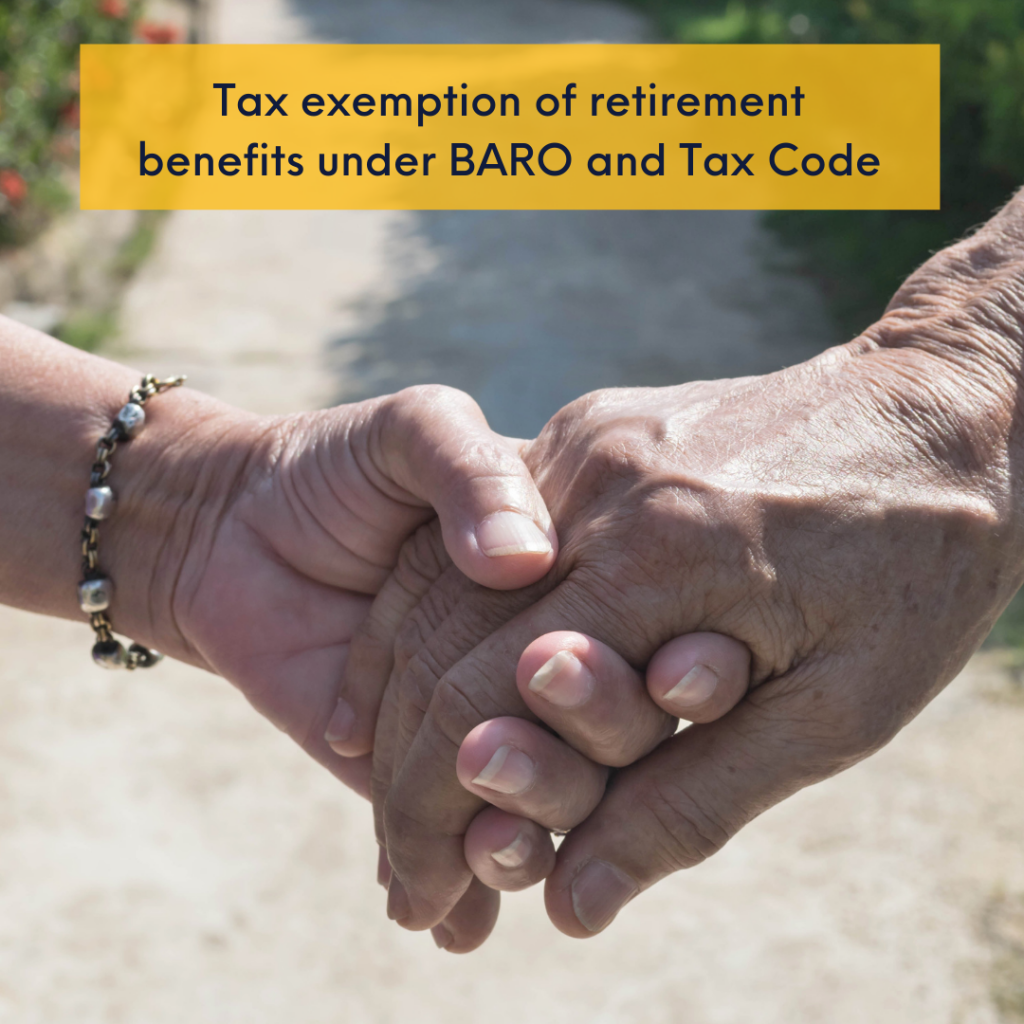
Published 7 December 2020, The Daily Tribune
Retirement is inevitable to everyone.
It is a sweet, blissful period when someone enjoys the benefits of long years of hard work and sacrifice.
When planned for properly, it is an opportune time for one to have some sort of financial security, knowing that a portion of his hard-earned money is set aside for his twilight years.
In order for retirees to further enjoy the substantial amount they had earned throughout those years and taking into special account the exigencies of the current situation, Republic Act (RA) 11494, or the Bayanihan to Recover as One Act (BARO), sought to provide measures to mitigate economic loss of the pandemic and provide socioeconomic relief to our fellow countrymen.
One notable feature of RA 11494 is the expansion of the exemption of retirement benefits from income tax.
Under Section 5 of RA 11494, retirement benefits granted between 5 June and 31 December 2020 shall be tax-exempt, provided that any re-employment of such official or employee in the same firm, within the succeeding 12-month period, shall be considered as proof of non-retirement and shall subject the benefits received to appropriate taxes.
It must be noted that even prior to the passage of RA 11494, the Tax Code as amended already provides for certain tax exemptions for retirement benefits upon meeting certain conditions.
Section 32(B)(6)(a) of the Tax Code provides that retirement benefits received under the mandatory provisions of the Labor Code, such as reaching 60 years old but not more than 65 years and has served for at least five years, are tax-exempt.
In contrast, there is no condition as to age of the retiree or number of years served with the company for the tax exemption on retirement benefits under RA 11494, hence it is deemed by tax experts as an expansion or broadening of income tax exemption of retirement benefits.
The Bureau of Internal Revenue (BIR) issued Revenue Memorandum Circular (RMC) 120-2020 on 9 November 2020 to provide further clarifications on this policy, stating that retirement benefits received by an employee in accordance with the BIR-registered retirement plan is exempt from income tax even though the employee did not meet the length of service condition under the approved employees’ retirement benefits plan.
The benefit is exempt from income tax for as long as the employee retired and received the benefits during the covered period of 5 June to 31 December 2020.
A duly registered retirement plan, as contemplated under Revenue Regulation (RR) 29-2020, is when it has been issued a Certificate of Qualification as a Reasonable Employees’ Retirement Benefit Plan.
It is issued by the BIR upon satisfaction of the conditions and prescribed requirements.
Only the amount received covered by the registered retirement plan will be exempt from Income Tax, provided that the retirement and the receipt of the benefits are within the covered period.
Any amount received by a retired employee in excess of what is provided in the BIR-registered retirement plan shall be taxable.
A retirement plan is duly registered with the BIR when it has been issued a Certificate of Qualification as a Reasonable Employees’ Retirement Benefit Plan.
On the other hand, retirement benefits given to employees pursuant to RA 7641, or the Retirement Pay Law, are tax exempt regardless of subsequent re-employment, and where the payee is already 60 years old and has rendered not less than five years of service.
Despite the tax exemption, the employees shall still be included in the Annual Alphabetical List of Employees since the same shall reflect the income received by the said employees for the year, inclusive of retirement benefits and other income payments.
However, if the employee who received the retirement benefits is subsequently re-employed in the company where he previously worked with or to any of its related parties within the succeeding twelve-month period reckoned from the date of retirement, the employee must pay the income tax due thereon.
If the company has no BIR-registered retirement plan, the retirement benefits provided to its retired employees is subject to income tax even if the retirement and payment thereof occurred during the covered period.
For comments and questions, please send an email to cabdo@divinalaw.com.

